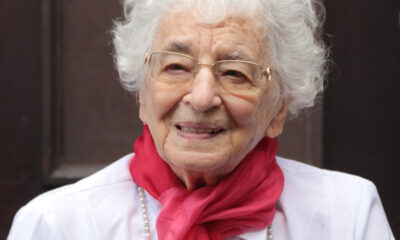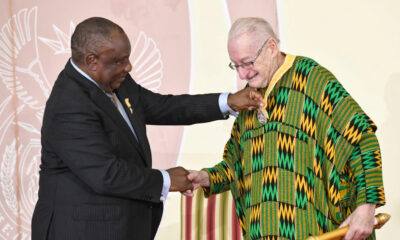
Featured Item

Katzin receives SA’s highest award for inclusion fund
When American Donna Katzin received the prestigious 2024 Order of the Companions of OR Tambo award along with a hug from President Cyril Ramaphosa on 30 April, she felt as if she was receiving it on behalf of millions of ordinary justice-loving people around the world.
Katzin’s upbringing in a segregated area in the south of America and her family’s commitment to tikkun olam (healing the world) have driven her to champion the financial inclusion of black-owned small, medium, and micro enterprises in South Africa.
Katzin is the founding executive director of Shared Interest, a non-governmental organisation dedicated to expanding access to loans for black-owned businesses in southern Africa. She received the National Orders at the presidential guesthouse in Pretoria. The orders are the highest awards that South Africa bestows on citizens and eminent foreign nationals who have contributed towards the advancement of democracy and made a significant impact on improving the lives of South Africans.
One of the 32 awardees and one of the six eminent foreign nationals awarded on the day, Katzin was recognised for her innovative thinking in assisting post-apartheid South African businesses get ethical investment by promoting networking between South African businesses and American investors.
This year was the thirtieth anniversary of the founding of Shared Interest in 1994. “Over those 30 years, we’ve managed to reach 2.3 million low-income black South Africans,” Katzin says. “We’ve worked to make it possible for struggling black South Africans to be able to start businesses, build and have access to affordable housing, get jobs, and for all of these things, to be able to get credit from mainstream banks and some smaller banks that otherwise wouldn’t have a habit of lending to low-income black people in the country. Some of that apartheid legacy continues, not because people are necessarily still biased, but because people have been trained in a certain tradition, and structures continue to operate as they have.”
Pre-1994, Katzin was an anti-apartheid activist who put pressure on the South African government for peaceful change. “We looked at the situation in 1994, and said, ‘We must think of how we can use the partnerships that we have built over these years.’ At that time, I was working for the Interfaith Center on Corporate Responsibility. One of our partners was Archbishop Emeritus Desmond Tutu.”
Katzin recalls the Nobel Peace Prize winner saying, “The end of apartheid was part one of the struggle, but part two was more difficult. To make the miracle endure, we asked you to disinvest, but now we encourage you to invest and make South Africa succeed for the sake of the world.”
Tutu’s words sparked Katzin and others into forming the Shared Interest fund.
“All of our investors have got their money back in full and on time. There hasn’t been a single loss,” Katzin says. This has demonstrated something profound about “communities that have been marginalised, economically disadvantaged, and victimised by apartheid and the ongoing scourge of poverty and racism”, she says. “It shows they are, in fact, good business partners, with proper technical assistance and facilities. Partnerships with communities and banks have helped us to take this first step into South Africa’s democracy.”
Katzin grew up in an area with “an apartheid feel, not legally apartheid, but if you crossed a certain street, the community went from black to white or white to black. It went from having facilities to not having facilities, from having streetlights that worked, jobs available, people with housing, and the opposite if you happened to be black”.
Katzin’s grandparents arrived in the United States as part of the Jewish exodus from Lithuania. Her mother was a teacher, and her father a small businessman. “My family worked hard for Jews to be accepted, to be able to have jobs and houses, and be understood in our community, which was a mix of black and white.
“My family has always been passionately interested in tikkun olam. My father was looking for ways to work with young people in the community as his business struggled, but still tried to provide opportunities for those around him. Some of my closest friends, including my godmother, were black African Americans, and they slowly began to let me know about the situation.
“As I was growing up, I worked on building community reinvestment, helping people fight segregation in housing, and building a bank that would lend to them. I moved to New York, and began working for a Jewish union, doing anti-apartheid work. I was totally bitten by the bug, so much so that my next job was with the Interfaith Center on Corporate Responsibility. It pressed companies to push South Africa for change. That went on through the 1980s until 1994.”
However, Katzin and others realised that there was still a role for them in doing the nation-building work that Tutu was so passionate about. “So, we set up Shared Interest to make it possible to accelerate the economic transformation that was so critical to South Africa’s success, and still is. I’ve been working for the company since then.
“I’ve been coming to South Africa maybe between two and four times a year, working with and visiting project partners in all the provinces, and now beginning to visit some of the neighbouring countries. We’ve reached so many people, but there are still so many more.”
Having just commemorated Pesach, Katzin says the exodus story resonates with so many, particularly in South Africa, as a light to a path of change. “When we know that Israelites wandered in the desert, according to the Bible, for 40 years, it shouldn’t be a surprise that South Africa hasn’t completely waved a magic wand and transformed itself.”
She fondly remembers the then general secretary of the South African Council of Churches, Frank Chikane, saying after the 1994 elections, “Congratulations South Africa. We’ve just crossed the Red Sea.” With his sly sense of humour, he added, “My friends, we are now in the wilderness.”










